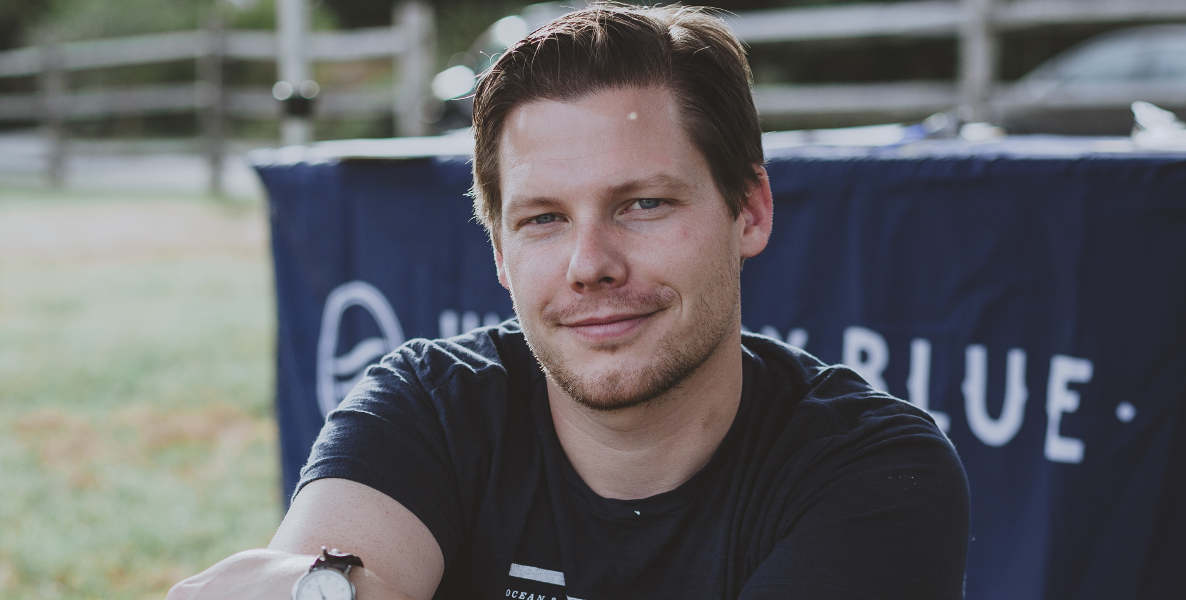In 2010, entrepreneur Brian Linton found himself at a crossroads. As a young businessman right out of college, he was traveling the East Coast, selling a jewelry line to resorts and boutiques, and donating a percentage of his proceeds to nonprofits that focused on water conservation, a lifelong passion. But he was unsatisfied—both in his business and in his charity. “I realized that as a small businessman, my impact was minimal,” he says.
So Linton started Philly-based United By Blue, a t-shirt manufacturer and outdoor gear retailer with a mission: For every item sold, UBB promises to clear one pound of trash from American waterways. So far, the company has been successful both as a business and as a movement. Since its founding, UBB has sold more than 150,000 items from its stores. With the help from volunteers during 116 cleanups, it has removed 203,000 pounds of trash from lakes, rivers and oceans across the country. Linton says UBB has seen 100 percent growth each year for the last two years, and he predicts business will double again this year—which means double the trash removal.
“I started a business with a focus on conservation so concrete that I’m talking from a cleanup,” Linton said over the phone one day last winter.
Linton grew up in Japan and Singapore, where his father’s IBM career took his family. While there, he raised tropical fish indoors and outdoors, had 30 fish tanks, and grew to understand the way water connects every being on earth. “Water was a big part of my life growing up on an island,” Linton says. He also came to recognize how much the earth’s water is in danger from pollution and trash, some 14 billion pounds of which ends up in the ocean every year.
Linton’s version of the one-for-one business model differs from those like Toms and Warby Parker—which send shoes or eyeglasses to needy people around the world every time one is purchased here—because Linton and his workers literally get their hands dirty. UBB organizes and pays for every cleanup from its office in Old City.
That idea of interconnectedness has governed every aspect of Linton’s business. With co-founder Mike Cangi, Linton started designing t-shirts made of organic cotton, and printed with graphics reminiscent of an outdoor lifestyle—airstreams and campfires and a solstice. Soon, UBB’s stores expanded into gear for actual outdoor living—things like high-end camping equipment, boat paddles and kitchenware. But it’s the t-shirts that are iconic to UBB—though at one point, it looked like they might also be the company’s downfall.
In October 2011, Linton realized that profits on his t-shirts had shrunk from 60 percent to 15 percent—a result of switching to a higher end cotton and using banana-fiber bags (instead of plastic or paper) for the packaging. To stay true to the company’s core, Linton needed to keep profits up to afford the cleanups the brand promised. But raising the prices of his already pricey t-shirts—they retailed for $29.50 at the time—was a risk. When he notified retailers that they’d need to charge $34 per shirt, 40—including Whole Foods and Urban Outfitters—said they couldn’t afford the new prices. Still, profits grew to 30 percent and within 8 months, 200 retailers were carrying UBB.
That same year, Linton formalized his company’s mission by signing on to become a B Corp, a fast-growing designation for businesses that meet rigorous standards of social and environmental performance, accountability and transparency. The B Corp movement was started by Wayne-based nonprofit B Lab, the brainchild of Jay Coen-Gilbert, Bart Houlahan and Andrew Kassoy. They confer a type of Good Housekeeping seal of approval for companies that really are doing good—as opposed to just practicing good marketing. They devised a rating system covering about 180 factors, ranging from how often a company buys local products and supplies to how it treats its employees. And they’ve created a new legal category—the B Corp—which extends a company’s fiduciary responsibility from shareholders to stakeholders such as employees, neighbors and the environment.
“Becoming a B Corp was a natural extension for what we believe in and helped us better understand what it means to be socially and environmentally responsible in everything we do,” says Linton.
Linton’s version of the one-for-one business model differs from those like Toms and Warby Parker—which send shoes or eyeglasses to needy people around the world every time one is purchased here—because Linton and his workers literally get their hands dirty. UBB organizes and pays for every cleanup from its office in Philadelphia. This allows the company to ensure the work is done properly, and to save costs by sharing resources—everything from people, to the office, to computers and other supplies.
“We do our own dirty work,” Linton says. “We decided that by internalizing the cleanup work we would be able to have a larger impact than if we donated money to an external organization.”
Linton’s eight-member staff—all based in Old City—choose cleanup locations based on where they have a retail presence, in Pennsylvania, California, Florida, Minnesota, Texas and Utah. Several of the cleanups have been throughout Philly, along Cobbs Creek, Tacony Creek, and the Schuylkill and Delaware rivers at various different parts. UBB announces the date and time of the cleanup online, on volunteer forums, the company’s website and through posters and postcards in local retail locations.
To make cleanups fun, UBB challenges volunteers to two games during cleanups. Early in the day, volunteers guess how many pounds of trash will be collected that day. And volunteers are encouraged to nominate one piece of trash as the wackiest find of the day—a list that has included a voodoo doll, bullets and a student ID from the 1908s. The winners take home UBB merchandise as prizes.
An average of 50 volunteers—including UBB staff—usually show up to each cleanup. UBB arms them with trash bags, trash pickers and gloves to cover those mightily important hands.
“Human hands are the best tool,” Linton notes.





